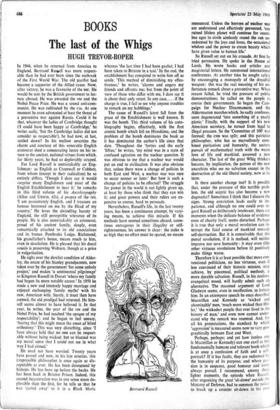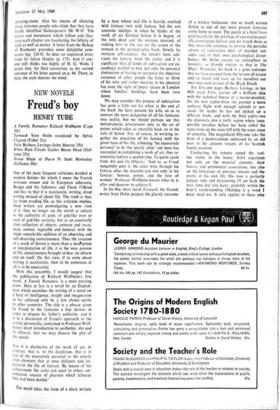The last of the Whigs BOOKS
HUGH TREVOR-ROPER
In 1944, when he returned from America to England, Bertrand Russell was more respect- able than he had ever been since the outbreak of the First World War. The old pacifist had become a supporter of the Allied cause. Now, after victory, he was a favourite of the sac. He would be sent by the British government to lec- ture abroad. He was awarded the om and the Nobel Peace Prize. He was a sound anti-com- munist. He was cultivated by the CIA. At one moment he even advocated at least the threat of a preventive war against Russia. Could it be that, whatever the ladies of Cambridge thought ('I could have been happy at Cambridge,' be writes sadly, 'but the Cambridge ladies did not consider us respectable'), he had now, at last, settled down? In his mellow seventies the charm and courtesy of this venerable English aristocrat shed a consecrating lustre on his re- turn to the ancient, national virtues from which, for thirty years, he had so deplorably strayed.
For Lord Russell is unmistakably an Eng- lishman : as English as Cromwell or Cobbett, from whom (except in their radicalism) he so entirely differs. 'Though I dare say it would surprise many Englishmen and most of the English Establishment to hear it,' he remarks in this third volume of his Autobiography (Allen and Unwin, 42s), a propos of the om, 'I am passionately English, and I treasure an honour bestowed on me by the Head of my country.' He loves the dwindling beauty of England, the still perceptible tolerance of its people. He is also unmistakably an aristocrat, proud of his ancient family, deeply, even romantically attached to its old associations and its homes. Pembroke Lodge, Richmond, his grandfather's house, means much to him, even in desolation. He is pleased that his ducal cousin is preserving Woburn, though at a price in vulgarisation.
He sighs over the derelict condition of Alder- ley, the estate of his Stanley grandparents, now taken over by the government 'for some unholy project,' and makes 'a sentimental pilgrimage' to Kingston Russell in Dorset 'where my family had begun its more notable career.' In 1950 he made a new and intensely happy marriage and enjoyed exchanging 'family myths' with his new, American wife. Surely, it must then have seemed, the old prodigal had returned. He him- self seems almost to have believed it. In that year, he writes, the year of the om and the Nobel Prize, he had reached 'the apogee of my respectability'; and he began to feel uneasy, 'fearing that this might mean the onset of blind orthodoxy.' This was very disturbing, since 'I have always held that no one can be respect- able without being wicked; but so blunted was my moral sense that I could not see in what way I had sinned.'
He need not have worried. Twenty years have passed and now, in his late nineties, this irrepressible philosopher is once again as dis- reputable as ever. He has been denounced by bishops. He has been up before the beaks. He has been back in Brixton Prison. Indeed, this second incarceration was in one sense more de- plorable than the first, for he tells us that he was 'carted away' to it in a Black Maria whereas 'the last time I had been gaoled, I had been taken to Brixton in a taxi.' In the end, the establishment has conspired to write him off as senile. 'This method of diminishing my effec- tiveness,' he writes, 'alarms and angers my friends and affronts me; but from the point of view of those who differ with me, I dare say it is about their only retort. In any case, ... if the charge is true, I fail to see why anyone troubles to remark on my babblings.'
The cause of Russell's latest fall from the grace of the Establishment is well known. It was the bomb. This third volume of his auto- biography begins, effectively, with the first atomic bomb which fell on Hiroshima, and the problem of the bomb dominates the book as it has dominated the author's life since that date. 'Thoughout the 'forties and the early 'fifties,' he writes, 'my mind was in a state of confused agitation on the nuclear question. It was obvious to me that a nuclear war would put an end to civilisation. It was also obvious that, unless there were a change of policies in both East and West, a nuclear war was sure to occur sooner or later.' But how is such a change of policies to be effected? The struggle for power in the world is not lightly given up, at least by those who think that they can win it; and great powers and their rulers are ex- pensive to coerce, hard to persuade.
Nevertheless, Russell's life, in the last twenty years, has been a continuous attempt, by vary- ing means, to achieve this miracle. If his methods have seemed sometimes absurd, some- times outrageous in their illegality or self- righteousness, his answer is clear: the stake is so high that no effort must be spared, no means
Bertrand Russell
renounced. Unless the horrors of nuclear war are understood and effectively prevented, 'our ruined lifeless planet will continue for count- less ages to circle aimlessly round the sun un- redeemed by the joys and loves, the occasional wisdom and the power to create beauty which have given value to human life.'
So Russell set out on his crusade. At first he tried persuasion. He spoke in the House of Lords. He wrote books and articles and magisterial letters. He summoned international conferences. At another time he sought safety by encouraging a monopoly of the dreadful weapon : this was the real meaning of his un- fortunate remark about a preventive war. When reason failed, he tried the pressure of public demonstrations; he called on the people to coerce their governments. So began the Cam- paign for Nuclear Disarmament, and the Aldermaston marches which, he sadly confesses, soon degenerated 'into something of a yearly picnic.' Finally, with the support of his new American secretary, he turned from legal to illegal pressure. So the 'Committee of 100' was formed; the CND was split; and this patrician philosopher, who has so marvellously com- bined puritanism and humanity, the austere pursuit of mathematical truth with the warm love of life and mankind, assumed a new character. The last of the great Whig thinkers became, by implication, the patron of the new anarchists who see no salvation except in the destruction of the old liberal society, now at its term.
Is there another change too? Is it possible that, under the pressure of this terrible prob- lem, the old sceptic has also become a new dogmatist? Sometimes I think that I discern the signs. Strong conviction leads easily to im- patience, and although no one could ever re- gard Russell as deliberately intolerant, there are moments when the delicate balance of evidence even of charity itself, seems disturbed. Perhaps it is true that only a moral revolution can in- terrupt the fatal course of mankind towards self-destruction. But it is conceivable that this moral revolution, if it is realised, will neither improve nor save humanity : it may even (like other virtuous revolutions before it) positively make things worse.
Therefore it is at least possible that more con- ventional politicians, no less virtuous, even if less convinced of their historic mission, may achieve, by piecemeal, political methods, a more durable salvation. Russell, in his zealous, evangelical mood, will hardly admit such an alternative. The reasoned argument of Lord Gladwyn seems, even in recollection, to irritate him. In an extempore speech he once described Macmillan and Kennedy as 'wicked and abominable' men, 'much more wicked than Hit- ler,' the wickedest people that ever lived in the history of man,' and even now cannot under- stand why the remark was resented. And, for all his protestations, the standard by which 'aggression' is measured seems now to vary geo- graphically between East and West. Perhaps, perhaps; and yet how (unless one is Macmillan or Kennedy) can one cavil at this fundamentally humane and tolerant book which is at once a confession of faith and a self- portrait? If it has faults, they are redeemed by the humanity of its purpose; and where pa- sion is in suspense, good humour and irony always prevail. I recommend, among the.e lighter moments, the episode when Russell. after organising the great 'sit-down' outside the Ministry of Defence, had to summon the police to break up a counter sit-down in his on n
drawing-room. Also his means of silencing those tiresome people who think that they have finally identified Shakespeare's `Mr W.H.' The letters and documents which follow and illus- trate each chapter are fascinating, for felicity of style as well as matter. A letter from the Bishop of Rochester provokes some delightful com- ments (pp. 126-8). So does an unprinted letter from Sir Julian Huxley (p. 173). And if any- one still thinks too highly of H. G. Wells, I direct him, for final correction, to the second sentence of his letter quoted on p. 44. There, as here, the style denotes the mind.







































 Previous page
Previous page